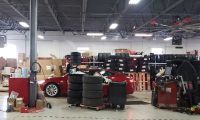Operations have been suspended at Nissan’s Japan plants through Sunday, March 13. Iwaki Plant (Iwaki City, Fukushima Prefecture), Tochigi Plant (Kawachi County, Tochigi Prefecture), Yokohama Plant (Yokohama City, Kanagawa Prefecture), Oppama Plant (Yokohama City, Kanagawa Prefecture), Zama Operations Center (Zama City, Kanagawa Prefecture) all suspended operations. Small fires broke out at the Tochigi Plant and the Iwaki Plant casting facilities but have been extinguished. Two employees at Tochigi Plant suffered minor injuries.
Nissan’s global headquarters building in Yokohama was not significantly affected, is safe and operational. So far, there are no reports of employee casualties and employee safety precautions are underway at all locations.
At this time, Nissan says it does not anticipate any immediate effect from the earthquake or tsunami on its Americas operations, facilities, dealers or customers. In addition, the company is monitoring the status of employees who have traveled to Japan locations to ensure their continued safety.
Toyota Motor Compotation (TMC) has established a company-wide emergency task force to assess the situation and take initial measures. As of now, Toyota has confirmed that there have been no injuries at the Tokyo head office, as well as the Higashifuji, Tochigi office, Yamanashi office, and Toyota Motor Tohoku facilities.
It is presently gathering information (as of 11 a.m. EST) on Central Motor Corporation and Kanto Auto Works. All TMC plants have restarted production.
The plants that have stopped production are Toyota subsidiary plants, including:
- Toyota Motor Hokkaido Plant
- Toyota Motor Tohoku Plant
- Central Motor Miyagi Plant
- Kanto Auto Works Tohoku Plant
Employees at these facilities have been evacuated to safe areas.
Toyota is also currently assessing the situation at its suppliers, dealers and the impact on North American import vehicles.
Suzuki issued this statement from its United States media operation: Suzuki Motor Corporation announced there is currently no reported harm to Suzuki’s personnel, headquarters or manufacturing plants located in the Shizuoka Prefecture region. The earthquake’s epicenter was located 240 miles north of Tokyo while Suzuki’s headquarters are in Hamamatsu City, which is 158 miles south of Tokyo."
Suzuki is gathering information about any additional effects to its operations, including port distribution, plant and dealership operations, as well as its vendors and suppliers located in the damaged areas. Due to widespread power outages communication is challenging, it said, but it will continue to report information as it is received.
Honda released this update:
Damage was widespread in the Tochigi area, where Honda has a number of operations. Honda Motor Co., Ltd. has confirmed the fatality of a Honda R&D associate at the Tochigi R&D Center, when a wall collapsed in a cafeteria. The associate was male, 43 years old. More than 30 Honda associates were injured in the Tochigi area from collapsing ceilings and other damage during the earthquake.
Some Honda plants have closed in Japan, and will remain closed through Monday.
- Tochigi Engine, transmission and chassis parts.
- Saitama Two plants: Sayama plant in the Saitama factory produces CR-V, Accord, U.S. Fit, Acura RL and TSX. In addition, Ogawa Plant in the Saitama factory produces automobile engines.
- Hamamatsu Two plants -- automobile transmissions, outboard marine engines.
- Suzuka operated Friday, will not be in production Monday. This factory produces Japan Fit, Civic, Civic Hybrid, Insight and Honda CR-Z (all hybrid models).
- Kumamoto Factory in southern Japan remains in operation (motorcycles).
Honda in Japan is assessing the resumption of operations and the long-term impact to its operations from the Japan earthquake.
There is no immediate impact on Honda's operations in North America. More than 80% of Honda and Acura products sold in the U.S. are produced in North America. The vast majority of automotive parts for Honda automobiles manufactured in North America are sourced in the region.
Honda is assessing the long-term impact, if any, on Honda auto production in North America, since some auto parts are supplied from Japan.
There will be no major impact on the availability of Honda products in North America. Honda Fit, Insight and CR-Z, and Acura TSX and RL are produced in Japan. A small percentage of CR-Vs are produced in Japan.










